Northwesterners Special Alert: Wave Books Weekend

Would you ride this man's bus? And how!
I think this event sounds incredible, and since it’s from the people who put on the Poetry Bus Tour in ’06, you can expect it to meet, greet & beat expectations. It’s like the Warped Tour decided to become the Pitchfork Festival or something. Or like poetry-Lollapalooza decided to do what real Lollapalooza did. Anyway, here’s some of what you can expect if you hit the University of Washington, Aug 14 – 16. For info on pricing and a more detailed schedule, check the Wave site. Word is there are only 150 tickets to be sold, and a limited number of daypasses, so if you live up that-a-way and are interested, better get cracking.
READINGS — in the Henry Auditorium, with smaller, exclusive readings in the James Turrell Skyspace — featuring Joshua Beckman, Noelle Kocot, Dorothea Lasky, Anthony McCann, Richard Meier, Eileen Myles, Maggie Nelson, Geoffrey Nutter, Matthew Rohrer, Mary Ruefle, Dara Wier, Jon Woodward, Matthew Zapruder and Rachel Zucker;
SCREENINGS OF FILMS starring John Ashbery, Robin Blaser, Jane Freilicher, Denise Levertov, Frank O’Hara, James Schuyler, John Wieners, and others;
poetry book DISCOUNTS at fourteen participating local, independent bookstores (a map will be provided);
a BOOK ARTS PRESENTATION by Sandra Kroupa, the Book Arts and Rare Book Curator in Special Collections at the University of Washington;
the Henry Art Gallery and EXHIBITIONS, including exhibitions of work by Chio Aoshima, Jasper Johns, Ann Lislegaard, Jeffry Mitchell & Tivon Rice; new video from China; and photographic work by Imogen Cunningham, Nan Goldin, Aleksandr Rodchenko, Andy Warhol, and others, from the Henry’s permanent collection;
and more, to be discovered…
David Ohle’s Boons + The Camp
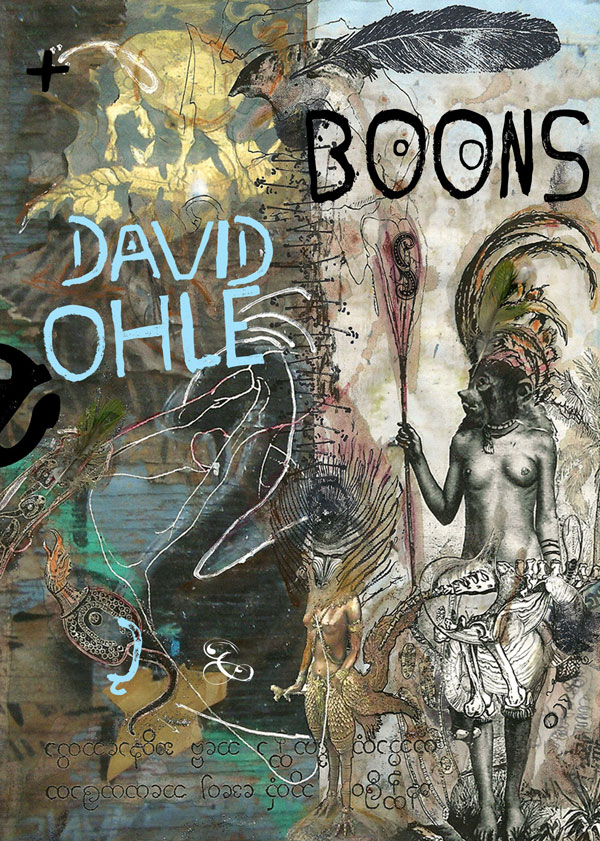
Coming very soon from Calamari Press is a double sided book containing two new works from the magical David Ohle, Boons & The Camp. Anyone familiar with Ohle already will know this is an event to be excited for, and those who don’t, well, it’s about time you ordered Motorman.
In anticipation of the book object, Derek White presents two video trailers, and a sneak peek of the gorgeous book covers, as well as further art from inside the book and on and on. I, for one, am quite excited:
Zak Smith’s We Did Porn
I have been reading Zak Smith’s We Did Porn this weekend. I am pretty sure you’re going to want this. One of those books that once you open you don’t stop thinking about wanting to read until it’s over. Plus it’s about porn and art. What else do I need to say?
Oh, it has drawings, along with the memoir, which follows Mr. Smith through his alt-porn career:
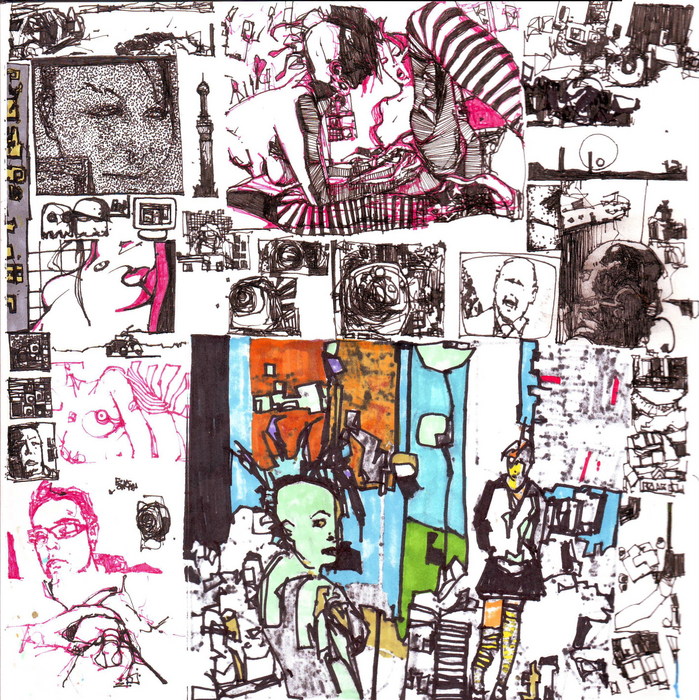
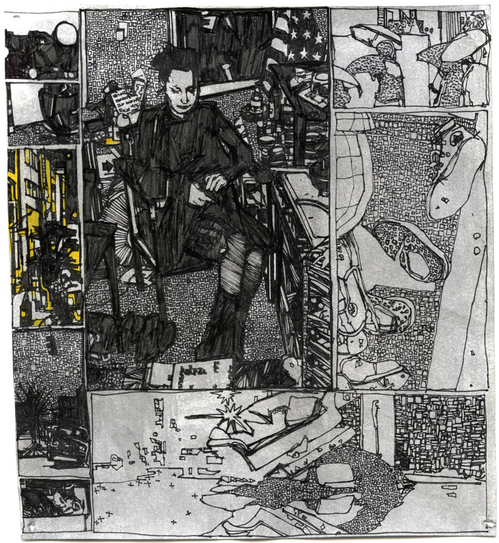
Quite quite engrossing, and in one of those voices that sounds fresh enough to not sound like anyone else while still maintaining the maximum fun and punk sass.
It was going to take a pretty amazing thing to follow up the Pictures Showing What Happens on Each Page of Thomas Pynchon’s Novel Gravity’s Rainbow idea, but yeah, halfway through I am ready to profess: Buy.
Dalkey Archive Interviewed
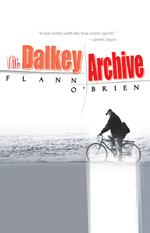 The LA Times blog, Jacket Copy, interviewed John O’Brien, founder of the amazing Dalkey Archive Press. Here’s an excerpt:
The LA Times blog, Jacket Copy, interviewed John O’Brien, founder of the amazing Dalkey Archive Press. Here’s an excerpt:
JC: How important do you think awareness of form, or a sense of play, is to telling a story in contemporary fiction?
JO’B: I think it should be, and I do emphasize “should,” at the heart of contemporary writing, but this playfulness is not always foregrounded as such. Fiction writing began with this strange consciousness of itself and the possibilities of playfulness, as though it were an inside joke with a great deal of eye-winking going on. The critic Viktor Shklovsky spent a lifetime tracing and exploring such things in relation to fiction, even as related to what would seem to be the un-playful writing of a Tolstoy or Dostoevsky. The fiction that I find unreadable is that which seems unaware of anything that has been written before, and the reader is supposed to go along with what is truly a “suspension of disbelief.” I find this fiction to be boring and condescending to the reader, though apparently many people like it.
Brian Evenson’s Baby Leg
 Uh, oh. Get this while you can kids: Brian Evenson’s Baby Leg, from Tyrant Press, in a limited edition illustrated hardback of 400 signed with bloodprints. $30 may seem like a lot to the sensitive kids, but these are going to go fast and never again, and the price at time of release will raise up to $35. I’d pay $80. This is a rarefied, intricate and bloody object, and you need it. Believe that.
Uh, oh. Get this while you can kids: Brian Evenson’s Baby Leg, from Tyrant Press, in a limited edition illustrated hardback of 400 signed with bloodprints. $30 may seem like a lot to the sensitive kids, but these are going to go fast and never again, and the price at time of release will raise up to $35. I’d pay $80. This is a rarefied, intricate and bloody object, and you need it. Believe that.
Believe me:
Review from Blake Butler
Via a series of sparely rendered dream loops, each wormed so deep into the other that it is no longer safe to say which might be which, Baby Leg extends the already wide mind-belt of Brian Evenson’s terror parade another mile, and well beyond. Those familiar with the Evensonian memory fractals, his freak-noir theaters, and his fetish for leagues of amputees, will find herein not only another puzzle box to nuzzle in its reader’s memory long after the book is closed, but as well enough blood and fearlight and paranoia to make Kafka or Hitchcock seem a foundling. “Who am I?” our narrator, Kraus asks, among Baby Leg’s endless questionings, its barrage. “Where am I?” “What is it?” “And now?” Thereafter, through the magicked wrath of Evenson’s dream speaking, from each of these questions birth more questions, and more questions, on and on, creating around the reader a glassy lockbox much like the one we find, we think, our Kraus, poor thing, inside.
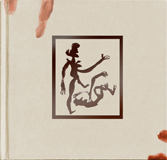 Seriously, how could you start off the first release from a press arm of the already massive Tyrant than this?
Seriously, how could you start off the first release from a press arm of the already massive Tyrant than this?
You can’t.
Preorder now before you are shelling out for it like they did for The Brotherhood of Mutilation, et al.
Best of the Web 2009 Invades HTMLGIANT: Guest Post by Jeff Parker
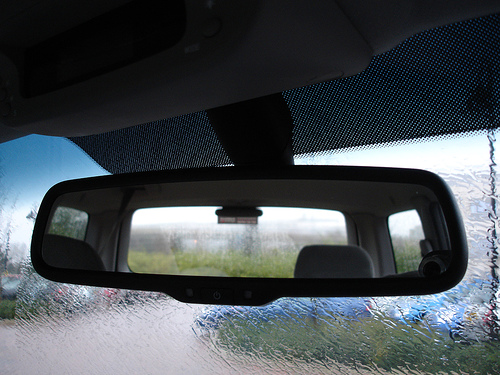 Please welcome guest poster Jeff Parker, author of Ovenman, to HTMLGIANT. The following is a short short essay of his (part of a Dzanc Books internet invasion to support the forthcoming Best of the Web 2009) that talks about the origins of his story “The Boy and the Colgante,” recently published in Waccamaw and now anthologized in BotW 2009.
Please welcome guest poster Jeff Parker, author of Ovenman, to HTMLGIANT. The following is a short short essay of his (part of a Dzanc Books internet invasion to support the forthcoming Best of the Web 2009) that talks about the origins of his story “The Boy and the Colgante,” recently published in Waccamaw and now anthologized in BotW 2009.
When Jonathan Messinger slotted me for the Dollar Store Reading series, I was torqued. The premise is as follows: Jonathan goes to a dollar store. Jonathan spends a dollar on something there. Jonathan sends that something to you (me, in this case). You write a story about it. You come to Chicago and read that story. I did lots of time in dollar stores and was well prepared for some good no-name household cleaning product or maybe a crappy toy. What I received sank my heart. It appeared to be a CD with an American flag printed on one side, but on further inspection it was a CD not to be played but to be hung from the rear view mirror of one’s car. It was called a colgante. This thing flummoxed me. It was like it came from another world. I had no reference point for it whatsoever. A colgante could not simply be there, an incidental detail. It commanded a more focal point. I put off writing the story until about two days before my trip to Chicago. I had just met some draft dodgers at Grossman’s tavern in Toronto. I figured the alienation I felt having this colgante thing in my life must be at least mildly resonant with the alienation they feel every day. I went for it. The result is here. I don’t really know if the thing played or not, but then I think that it must have.
You can read more posts by BotW authors at several other sites. Check out EWN for details. Thanks to Jeff Parker for the post and to Dan Wickett for asking HTMLGIANT to host.
Matt Bell, Matthew Derby & the Best of the Web

Did everyone else already know that Matt Bell is going to be the series editor for Dzanc’s Best of the Web series, beginning with the 2010 book? I didn’t, but aren’t I glad to know it now? Yes. Anyway, I learned this information in a note Matt posted to facebook about also-Matt Matthew Derby, whose story “January in December” from Guernica will be anthologized in BotW2009, edited by Lee K. Abbott. (Disclosure/chest-beating: I am a proud alum of the BotW series; my story “The Jealousy of Angels” appeared in the 2008 edition, which was edited by Steve Almond.) After the jump, MB’s full facebook post: his explanation of what BotW is, his introduction of Derby, and then a long guest-post by Derby himself about the writing of “January in December.”
Eric Oberauf On The New Publishing Model: Not Boutique But Better
 Eric Oberauf, captain of the publishing house Two Dollar Radio, has a great article in the new Brooklyn Rail arguing that we should be sober but optimistic about the printed book object and its success as a method of literary distribution. In “The Revenge of Print,” Oberauf explains the relevance of independent presses very well, summarizes the identity crisis that passes for a business model at most big and butterchurning book houses, and argues with a thoughtful and historically aware perspective that adapting a “realistic scale” isn’t downsizing expectations but getting back to mattering. What his argument reminds us is that people pay for books not because they’re addicted to mulch, but to read words and like words and carry words around so they can read them some more, which makes the whole thing more communication than commodity. Maybe you’re going to make more friends than money, it’s true. So if corporate book publishers want to continue tricking any cash into falling toward them, they might want to remember that books are closer to party invitations than to coat hangers.
Eric Oberauf, captain of the publishing house Two Dollar Radio, has a great article in the new Brooklyn Rail arguing that we should be sober but optimistic about the printed book object and its success as a method of literary distribution. In “The Revenge of Print,” Oberauf explains the relevance of independent presses very well, summarizes the identity crisis that passes for a business model at most big and butterchurning book houses, and argues with a thoughtful and historically aware perspective that adapting a “realistic scale” isn’t downsizing expectations but getting back to mattering. What his argument reminds us is that people pay for books not because they’re addicted to mulch, but to read words and like words and carry words around so they can read them some more, which makes the whole thing more communication than commodity. Maybe you’re going to make more friends than money, it’s true. So if corporate book publishers want to continue tricking any cash into falling toward them, they might want to remember that books are closer to party invitations than to coat hangers.
Here’s a pull quote:
The goal for book publishers, most simply put, should not be to undertake a virtual arms race of developing technology with both the Internet and media, or to try to compete on a bloated scale with music and film, or even to translate a work to conform to an undetermined potential future model. The mission for book publishers and print media at large should be to create a product that is irreplaceable and indispensable.
The Codex, the Hurders, and me: a new book, an old book, and two years of intermittent emailing

If I had to pick the single piece of my own writing that has generated the most reader responses, I would without hesitation name “The Codex Seraphinianus: A Fragment of the Complete History of an Unknown Planet,” an essay about Luigi Serafini’s hallucinatory faux-encyclopedia which The Believer published in May, 2007. (Aside: I’m hoping to meet or beat this record with “A Figure in the Distance Even to My Own Eye,” my new essay in the current issue of The Believer.) Two years out, the Codex essay continues to bring me new and interesting correspondence, to the tune of at least a letter or two per month. People write to say they enjoyed the piece, to thank me for turning them onto the Codex, or to share their own stories about when they first discovered it, or what they think it all means. Sometimes they want to know if the text has been “deciphered” yet, or if I personally think it can be deciphered at all. Often, they just want to know if I can send them the full text of Calvino’s introduction (it isn’t available in English, so I commissioned a translation from the French version, but it was only briefly quoted in the essay). Anyway, today I’m thrilled to share with you all news of a new Codex-related publication: Confronting and Collecting the Works of Luigi Serafini, available as a severely-limited edition (100 copies!) chapbook by Jordan and Justine Hurder.
